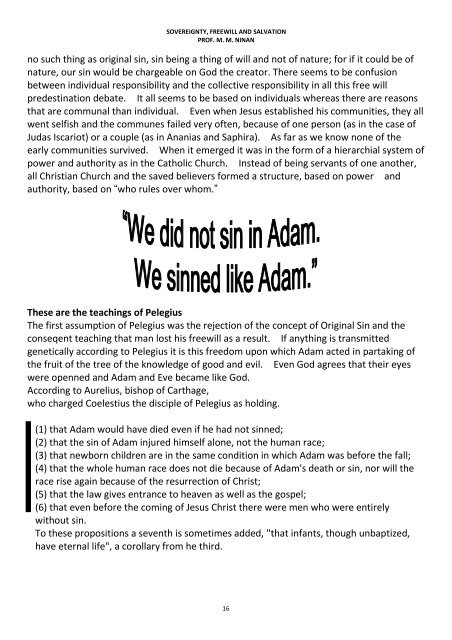Calvinism and Arminianism
Create successful ePaper yourself
Turn your PDF publications into a flip-book with our unique Google optimized e-Paper software.
SOVEREIGNTY, FREEWILL AND SALVATION<br />
PROF. M. M. NINAN<br />
no such thing as original sin, sin being a thing of will <strong>and</strong> not of nature; for if it could be of<br />
nature, our sin would be chargeable on God the creator. There seems to be confusion<br />
between individual responsibility <strong>and</strong> the collective responsibility in all this free will<br />
predestination debate. It all seems to be based on individuals whereas there are reasons<br />
that are communal than individual. Even when Jesus established his communities, they all<br />
went selfish <strong>and</strong> the communes failed very often, because of one person (as in the case of<br />
Judas Iscariot) or a couple (as in Ananias <strong>and</strong> Saphira). As far as we know none of the<br />
early communities survived. When it emerged it was in the form of a hierarchial system of<br />
power <strong>and</strong> authority as in the Catholic Church. Instead of being servants of one another,<br />
all Christian Church <strong>and</strong> the saved believers formed a structure, based on power <strong>and</strong><br />
authority, based on “who rules over whom.”<br />
These are the teachings of Pelegius<br />
The first assumption of Pelegius was the rejection of the concept of Original Sin <strong>and</strong> the<br />
conseqent teaching that man lost his freewill as a result. If anything is transmitted<br />
genetically according to Pelegius it is this freedom upon which Adam acted in partaking of<br />
the fruit of the tree of the knowledge of good <strong>and</strong> evil. Even God agrees that their eyes<br />
were openned <strong>and</strong> Adam <strong>and</strong> Eve became like God.<br />
According to Aurelius, bishop of Carthage,<br />
who charged Coelestius the disciple of Pelegius as holding.<br />
(1) that Adam would have died even if he had not sinned;<br />
(2) that the sin of Adam injured himself alone, not the human race;<br />
(3) that newborn children are in the same condition in which Adam was before the fall;<br />
(4) that the whole human race does not die because of Adam's death or sin, nor will the<br />
race rise again because of the resurrection of Christ;<br />
(5) that the law gives entrance to heaven as well as the gospel;<br />
(6) that even before the coming of Jesus Christ there were men who were entirely<br />
without sin.<br />
To these propositions a seventh is sometimes added, "that infants, though unbaptized,<br />
have eternal life", a corollary from he third.<br />
16

















